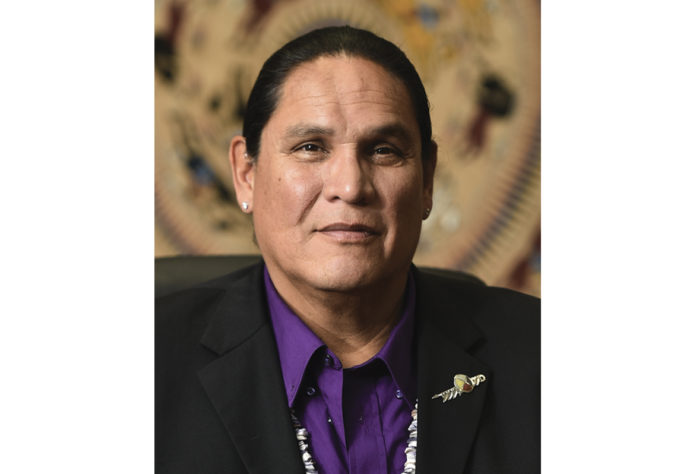by Ernest L. Stevens, Jr.
On March 11, 2021 – just over one year after the U.S. declared the COVID-19 pandemic a national emergency – President Biden signed the American Rescue Plan, a $1.9 trillion coronavirus relief package, delivering his number one promise to the American people: getting the virus under control by healing our citizens and our economies.
The coronavirus has tested the resolve of the entire nation. America has suffered tragic losses. The COVID-19 pandemic created a health and economic crises in the U.S., taking more than 525,000 American lives; infecting nearly 30 million Americans; and more than 10 million remain unemployed.
Native America has been particularly hard hit. The CDC reports that on a per capita basis, Native Americans have the highest COVID-infection, hospitalization, and death rates of any community in the Nation. Tribal economies, many of which rely on government revenue generated in the hospitality industry – gaming, hotels, restaurants, and tourism – suffered much of the brunt of shutdowns to prevent spread of the virus. It is estimated that tribal government-owned enterprises sustained 35 percent revenue losses in 2020 alone. These lost government revenues have forced many tribes to furlough government employees and cut essential education, health, housing and safety services to Reservation residents.
President Biden campaigned on a promise to focus first on defeating COVID-19. With the American Rescue Plan, the President delivers on this promise in historic proportions.
On March 9, 2021, the National Indian Gaming Association held our winter legislative summit. House Resources Chairman Raul Grijalva talked about the historic nature of President Biden’s American Rescue Plan. It sets the framework for how Indian Country should be funded, and what American children and families need to return to the new normal. During summit, I recognized the strong efforts that our Indian nations and tribes have made to ensure that the needs of Indian Country are respected.
House Defense Appropriations Chair Betty McCollum said, “ Indian Country will address overdue needs, and we’ll have new Native American leadership at Interior, with Secretary Deb Haaland. The Biden Rescue Plan will lift many of the economic burdens in Indian Country, and help lift Native people out of poverty.”
The Rescue Plan invests in vaccine production and distribution, and virus testing and tracing. To help lift our economy, the Act will: send resources to those hit hardest by the virus in the form of $1,400 recovery rebates to give a hand up to Americans earning less than $75,000; provide rental and housing assistance; extend federal unemployment relief an additional six months; boost funding for families with children in the form of tax credits and resources for child care, and much more.
For Indian Country, the American Rescue Plan will send more than $31 billion to tribal governments: by far the largest investment targeted to Native programs in history. These resources reflect the disparate health and economic impacts of the virus on Native Americans, the federal government’s solemn treaty and trust obligations, and the sovereign status of Indian tribes as governments.
The largest program in the bill sends $20 billion to tribal governments through the Coronavirus Fiscal Recovery Funds. The program improves on the CARES Act’s Coronavirus Relief Fund by respecting the local decision making of tribal governments to target the resources where they are needed most and provides more time to utilize the funds to make sound decisions. In outlining the uses of the state, local and tribal government coronavirus relief funds, the Act specifically references the public health emergency, assistance to household, small businesses and hard hit industries including the hospitality industry, and assistance for continuing tribal government programs and services.
With hospitality a focus of the Rescue Plan, this means relief for our Indian Nations engaged in Indian gaming because, above all, Indian gaming is hospitality. Our Indian nations provide a warm welcome to our friends and neighbors who come to visit us for entertainment, food and beverages and lodging. Across America, our guests find the finest hospitality at our casinos and resorts, and with all of the public health closures and limitations, we need help to get back to normal.
The Rescue Plan also provides more than $6 billion for Indian health care programs and services, increased funding for Indian education, housing, food distribution, child care, preservation of Native languages, funding to enable tribes to establish guaranteed loan programs in coordination with CDFIs, and more.
President Joe Biden and Congress are providing the steady leadership that we all need in these challenging times. Many thanks to the Biden Administration and Congress who crafted the American Rescue Plan to ensure that the impacts of the pandemic on Indian Country will be fully addressed.
With passage of the American Rescue Plan, the light at the end of the tunnel just got brighter. By the end of May, President Biden expects that America will have enough vaccines for all Americans – and that’s cause for real hope. For now, we need to continue to wear our masks and stay safe.
Ernest L. Stevens, Jr. is Chairman of the National Indian Gaming Association. He can be reached by calling (202) 546-7711 or visit www.indiangaming.org.














































